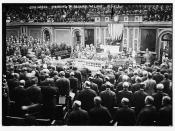Equal Pay Act � PAGE \* MERGEFORMAT �1�
Running Head: The Equal Pay Act of 1963 Paper
The Equal Pay Act of 1963 Paper
Team B
University of Phoenix
BUS 415
Kim Rhymes
May 28, 2009
�
�
The Equal Pay Act of 1963
Throughout history, women have been paid less than men have, even when employed in identical jobs. It was generally accepted in the United States that men deserved to earn more money than women do, even if their work was identical. The contemporary mindset was that men were the heads of the households and therefore were the primary income producer in their families. This, of course, was not always so. In many homes, the head of household and sole breadwinner was a woman, for various reasons, ranging from death or disability of a spouse to divorce or single parenthood (DfEE).
Regardless, the tradition of the men being the head of household was difficult to change.
Even during World War II, when women were then being encouraged to go to work doing the same exact jobs the men did, women received about half the pay the men made. Then, when the men returned from the war, women had to give up their jobs and let the men have them back.
Just before World War I, there were attempts made in some states to protect women by instituting minimum wage laws for women workers. However, the Supreme Court declared them unconstitutional in 1963. Then President John F. Kennedy's Commission on the Status of Women recommended that Congress pass a law guaranteeing that women would receive equal pay with men for equal duties performed (The U.S. Equal Employment Opportunity Commission [TUSEEOC], 1997). On June 10, 1963, the Equal Pay Act was passed by Congress declaring that women and men must...


